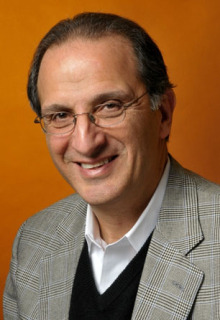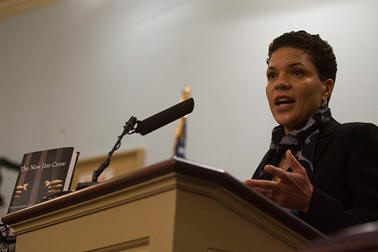www.aljazeerah.info
Opinion Editorials, January 2019
Archives
Mission & Name
Conflict Terminology
Editorials
Gaza Holocaust
Gulf War
Isdood
Islam
News
News Photos
Opinion Editorials
US Foreign Policy (Dr. El-Najjar's Articles)
www.aljazeerah.info
Time to Break the US Silence on Palestine, Says Michelle Alexander By James J Zogby Al-Jazeerah, CCUN, January 28, 2019 |
 |
 |
|
| Michelle Alexander |
Michelle Alexander Has Opened a Door, We Must Work to Keep It Open
This past Sunday, the New York Times featured on the front page of
its "Week in Review" section a major column by Michelle Alexander - "Time
to Break the Silence on Palestine." It was, by any measure, an
important article because of who wrote it, where it appeared, and its
breathtaking indictment of both Israel's history of violations of
Palestinian rights and the silence of US policymakers to address these
outrageous behaviors.
As a renowned civil rights attorney and
author of the best-selling "The New Jim Crow: Mass Incarceration in the
Age of Colorblindness," Alexander's voice matters. While in the past the
Times has run a few opinion pieces critical of Israel, the placement and
promotion given to this article guaranteed that it would gain national
attention. And it did. Millions read it, tens of thousands commented on
it, and scores of others wrote columns favorably reviewing Alexander's
observations.
The reaction in Israel and among the American
Jewish establishment was immediate and predictably hysterical. A former
Israeli Ambassador to the US said that Alexander's article "dangerously
delegitimizes us. It is a strategic threat..." The Anti-Defamation
League, B'nai B'rith, and the American Jewish Committee in tweets and
statements called the article: "dangerously flawed"; "anti-Semitic"; an
"anti-Israel rant...filled with errors"; "a shameful appropriation" of
the memory of Martin Luther King.
This panicked reaction to
Alexander was unsurprising because it represents just one more
indication that hardline Israeli propagandists are losing their ability
to shape political discourse on the Israeli-Palestinian conflict. As
Alexander notes in her article, in recent years we have seen: major US
churches divesting from Israel, the growing support of young African
American activists with the cause of justice for Palestinian; the
backlash over the firing of a CNN commentator over his pro-Palestinian
positions; and the election of pro-Palestinian Members of Congress.
Because these developments only scratch the surface of the change
that is underway, the nervousness demonstrated by the Jewish
establishment was to be expected. Polling shows that Israel has lost
significant support among the young, the educated, and minority
communities (African American, Latino, and Asian American - who together
comprise about a third of the US population). As a consequence, there is
a debate on Israel/Palestine underway on campuses, among major
Protestant churches, in the Black community, and in the Democratic
Party. And, in this debate, arguments demanding justice for Palestinians
are being heard and winning.
In challenging this drift,
pro-Israel propagandists have drawn all their weapons. Pro-Palestinian
activists and commentators have been smeared, intimidated, and
threatened with dire repercussions. While some voices have been
silenced, the movement away from accepting the Israeli line continues to
grow.
If I were to identify two main reasons for this erosion of
support for Israel and increased support for Palestinians, I would point
to the role that alternative media has played in making it possible for
the reality of what is happening in the occupied territories to be
better known and the role played by the virtual marriage of US President
Donald Trump and Israeli Prime Minister Benjamin Netanyahu.
My
brother John Zogby observed in his important study of the changing
attitudes of American demographic groups that as a direct result of the
internet, young people and minority communities have developed a global
consciousness - they are less tied to narrow parochial concerns. They
have access to more sources of information and are more questioning of
the "accepted dogma" of political elites. As Israel continues its
rightward drift, with ultra-nationalists in control now and for the
foreseeable future, and as the Christian right-wing and nativists
continue to dominate the Republican Party, it is to be expected that
alliances would be formed in opposition to this bonding of US and
Israeli hardline ideologues.
As I noted, this change has been
brewing for some time now, but it was the Michelle Alexander article in
the New York Times that has helped bring it to the surface. As important
as this moment may be, I must admit that my delight was tempered by the
feelings of regret that all of this change has come too late for so
many.
I thought of the Nakba and the uprooting and dispossession
of hundreds of thousands of Palestinians from their homes and how for
decades they have been denied the right to return. I thought of the
horrors of the now 70 year occupation of the West Bank, Gaza, and East
Jerusalem - the theft of their land, the economic strangulation to which
they've been subjected, the demolition of their homes, the brutal
unreported acts of collective punishment, the torture, the prolonged
imprisonment of thousands without charges, and the daily humiliation
they have endured at the hands of soldiers and settlers. And I thought
of the courageous intellectuals and activists, Arabs and Jews, here in
the US and in Israel and Palestine, who over the decades paid a dear
price for their efforts to elevate Palestinian rights in a less
welcoming time.
And then I thought of the brilliant Palestinian
Fayez Sayegh, who decades ago gave us hope that one day change would
come - that the tide would turn when we didn't expect it and we would
discover that despite the power of our opponents, change was afoot and
we would see a way forward.
Here it is - the moment he
predicted. A door has opened, but knowing that our opponents will be
working hard to slam it shut, we must redouble our efforts to build the
movement that challenges Israel's history of oppression. We owe this
much to those victims of the past and to those who are still suffering
from dispossession and occupation. Alexander has shown us an open door.
We have to have the courage and commitment to continue to keep it open.
***
Share the link of this article with your facebook friends
|
|
|
|
||
|
||||||


